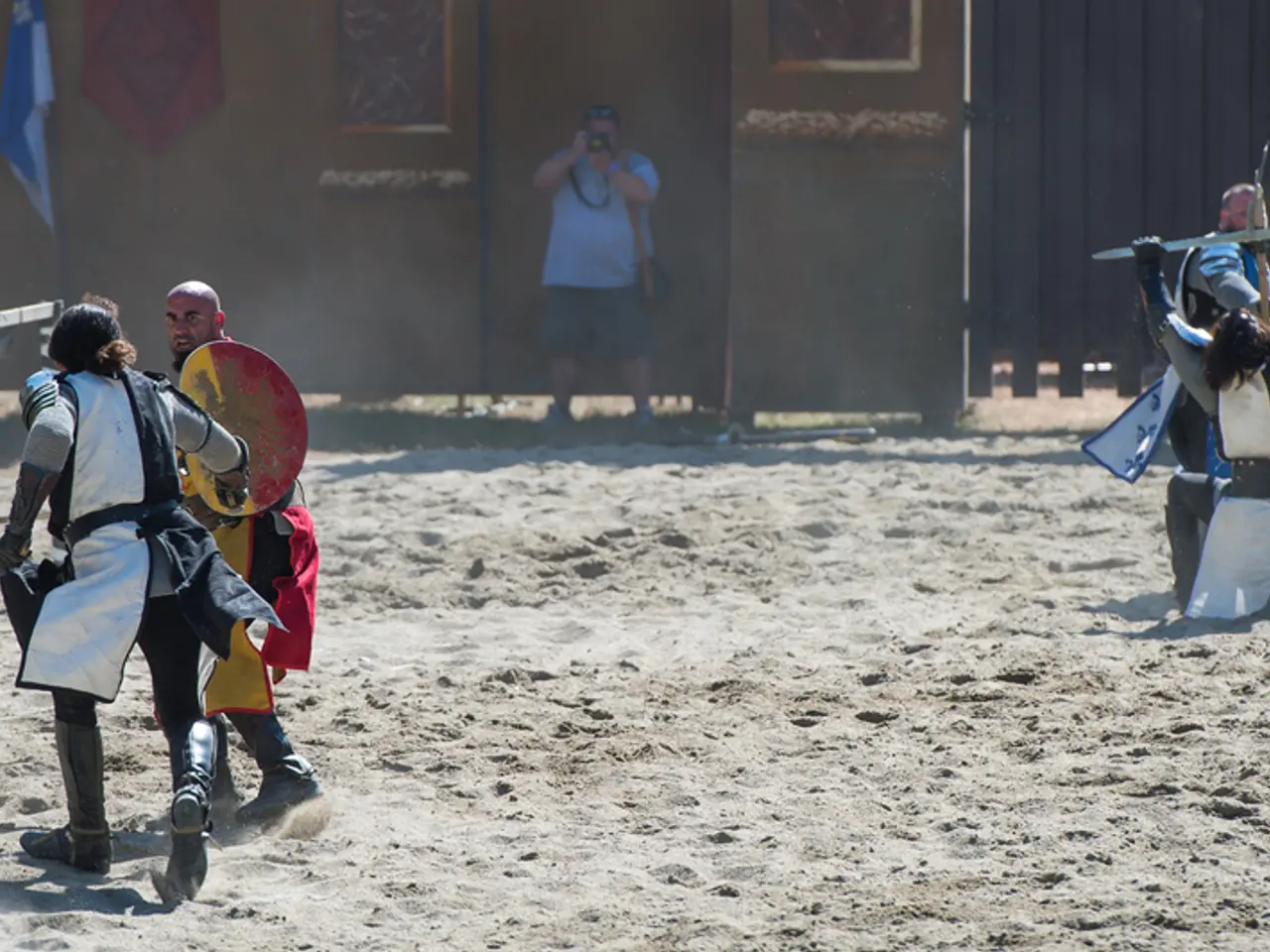Taiwan contemplates potential Chinese invasion, portrayed in TV shows and video games
In the heart of East Asia, the Taiwanese drama series Zero Day Attack has sparked a heated debate, with its portrayal of a potential Chinese invasion of Taiwan. The series, which has topped drama rankings on public TV and multiple streaming platforms, has long been a sensitive subject for Taiwanese filmmakers due to fears of repercussions from China and the risk of losing access to the Chinese entertainment market [1].
The drama, set in 2028, imagines a Chinese invasion of Taiwan, vividly dramatizing the threat posed by China to the island nation [1][2]. This depiction has drawn polarized responses. Supporters in Taiwan consider the series a crucial wake-up call, encouraging public discussion about Taiwan's preparedness for possible conflict, especially amid rising military threats from China [1]. However, the Chinese government has condemned the show, with the Chinese Defense Ministry spokesman accusing it of "selling anxiety and provoking war," reflecting Beijing's sensitivity to media that dramatizes conflict or separatism involving Taiwan [3].
Another Taiwanese production, the board game Reversed Front, allows players to infiltrate the Chinese Communist Party from Taiwan, Hong Kong, or other surrounding areas [4]. Similarly, a board game titled 2045 simulates a Chinese military attack in 2045 and Taiwan's subsequent division into six different forces [5]. These productions reflect a growing trend where imagining a Chinese invasion is no longer taboo in Taiwan [6].
Taiwanese creatives have been inspired by the severity of the war in Ukraine, as well as research and consultation with national security experts [7]. According to Tai, a professor for political economy of communication, these films and games evoke a spectrum of emotions due to Taiwan's deep partisan divides over cross-strait relations [8].
The controversy surrounding Zero Day Attack is not just about entertainment. It reflects the underlying cross-strait tensions: Taiwan's attempt to address and prepare for real security threats through media contrasts with China's objections to such narratives, which it views as inflammatory and politically provocative [1][3]. The series is notable as one of the first Taiwanese productions openly addressing this topic [1].
Meanwhile, the main opposition Kuomintang (KMT) has accused the ruling Democratic Progressive Party (DPP) of using public funds to promote a "sense of national doom" in the series [9]. On the other hand, Johnny, spokesperson for Reversed Front, aims to present a realistic picture of the political landscape in East Asia and hopes Taiwan can learn how to take countermeasures against infiltration from Beijing [10].
As the tension between Taiwan and China continues to escalate, it remains to be seen how these media productions will shape public opinion and potentially influence future political decisions.
References: [1] BBC News. (2022, March 21). Taiwan's Zero Day Attack: TV drama sparks debate over war with China. https://www.bbc.com/news/world-asia-60815117 [2] Reuters. (2022, March 18). Taiwan's Zero Day Attack TV show sparks debate over China tensions. https://www.reuters.com/world/china/taiwans-zero-day-attack-tv-show-sparks-debate-over-china-tensions-2022-03-18/ [3] South China Morning Post. (2022, March 18). China's defence ministry slams Taiwanese TV drama Zero Day Attack as 'politically motivated' and 'provocative'. https://www.scmp.com/news/china/military/article/3166686/chinas-defence-ministry-slams-taiwans-zero-day-attack-tv-drama [4] South China Morning Post. (2022, March 22). Taiwan's Reversed Front board game banned in Hong Kong for violating National Security Law. https://www.scmp.com/lifestyle/gaming/article/3167786/taiwans-reversed-front-board-game-banned-hong-kong-violating-national [5] South China Morning Post. (2022, March 23). Taiwan's 2045 board game simulates a Chinese military attack in 2045. https://www.scmp.com/lifestyle/gaming/article/3167872/taiwans-2045-board-game-simulates-chinese-military-attack-2045 [6] South China Morning Post. (2022, March 23). Taiwan's 2045 board game simulates a Chinese military attack in 2045. https://www.scmp.com/lifestyle/gaming/article/3167872/taiwans-2045-board-game-simulates-chinese-military-attack-2045 [7] South China Morning Post. (2022, March 23). Taiwanese creatives find inspiration in Ukraine's war. https://www.scmp.com/lifestyle/gaming/article/3167875/taiwanesecreatives-find-inspiration-ukraines-war [8] South China Morning Post. (2022, March 23). Taiwanese creatives find inspiration in Ukraine's war. https://www.scmp.com/lifestyle/gaming/article/3167875/taiwanesecreatives-find-inspiration-ukraines-war [9] South China Morning Post. (2022, March 23). Taiwan's main opposition Kuomintang accuses ruling party of using public funds to promote a 'sense of national doom' in Zero Day Attack. https://www.scmp.com/news/china/politics/article/3167891/taiwans-main-opposition-kuomintang-accuses-ruling-party-using [10] South China Morning Post. (2022, March 23). Taiwan's Reversed Front board game banned in Hong Kong for violating National Security Law. https://www.scmp.com/lifestyle/gaming/article/3167786/taiwans-reversed-front-board-game-banned-hong-kong-violating-national
- The debate surrounding the Taiwanese media production, Zero Day Attack, extends beyond the realm of entertainment, as it reflects the economic tension between Taiwan and China, with China viewing such narratives as politically provocative.
- In contrast to the government's objections, Taiwanese creators of games like Reversed Front and 2045 view their productions as vital for preparing the public for potential conflicts in Asia, learning from the political landscape and security threats, such as those in Ukraine.
- The media in Asia plays a significant role in shaping public opinion, as the ongoing depictions of conflict and separatism involving Taiwan in Taiwanese media, like sports discussions and news reports, fuel the underlying cross-strait tensions.




